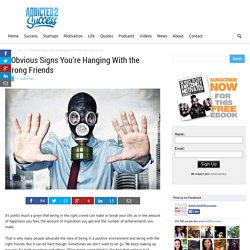

Things to Never Say in an Interview - The Muse. In an interview, your primary goal is to get across to the hiring manager why you—above all the other candidates—are the right person for the job.

That you have the right set of skills, a great personality, and the drive to really make things happen in your new role. But as you’re preparing answers to interview questions that’ll let you do all of those things, it’s equally important to know what the hiring manager will consider a red flag. After all, a wrong move or two, and it won’t matter how great your sales numbers at your last job were. To help you out, steer clear of these 30 messages. You’ll make sure that your awesome abilities and accomplishments—not a totally avoidable faux pas—will be what your interviewer remembers. 1.
Rule #1 of interviewing: Do your research. 2. No matter how bad a job was, you never, ever want to badmouth a former employer in an interview. 3. Similarly, you don’t want to speak negatively about anyone you’ve worked with in the past. 10 Signs You Should Quit Your Job ASAP. How to Read a Mind — The University of Nottingham. How do we read and model fictional minds?

Introducing cognitive poetics: the application of cognitive science to literary reading. <p>Unable to play video. Please enable JavaScript or consider upgrading your browser. </p> Loaded: 0% Progress: 0% Download video: standard This course offers an introduction to what has come to be known as cognitive poetics. How to Read a Mind is part of a series of ‘how to read’ courses which are being presented by applied linguists, discourse analysts and literary critics at The University of Nottingham. In advance of the course starting you can join the conversation using #FLread or contact @PeterJStockwell on Twitter. This course will give you the opportunity to purchase a Statement of Participation There are no previous requirements needed to take part in this course.
Join the conversation on social media Use the hashtag #FLread to join and contribute to social media conversations about this course. How to Read Your Boss — The University of Nottingham. How can we talk more effectively in the workplace?

This course introduces linguistic techniques to enhance business communication. <p>Unable to play video. Please enable JavaScript or consider upgrading your browser. </p> Loaded: 0% Progress: 0% Download video: standard or HD Think about the conversations you have had in your workplace over the past few months. The course presents a set of ‘linguistic toolkits’ which you can use to create a linguistic profile of yourself and others, including your boss. How to Read Your Boss is the second in a series of ‘How to read…’ courses which will be presented by applied linguists, discourse analysts and literary critics at The University of Nottingham.
How to Read Your Boss will be useful for anyone working within businesses/organisations in the public, private or third sector, including managers and those with leadership responsibility. 7 Obvious Signs You're Hanging With the Wrong Friends. It’s pretty much a given that being in the right crowd can make or break your life, as in the amount of happiness you feel, the amount of inspiration you get and the number of achievements you make.

That is why many people advocate the idea of being in a positive environment and being with the right friends. But it can be hard though. Sometimes we don’t want to let go. We keep making up excuses for both ourselves and others. Other times, we’re blind to the fact that we’re in bad company. Do yourself a favour and just drop the toxic friends. 1) They make money an issue They borrow, but never return on time, if at all. 2) They never follow up with what they say they’d do for you In other words, they’re full of crap. 3) They’re always too busy for you.
كيف تطوّر شخصيتك وتتغلب علي الخجل ؟ ( نصائح رائعة ) 185 Powerful Verbs That Will Make Your Resume Awesome. Led… Handled… Managed… Responsible for… Most resume bullet points start with the same words.

Frankly, the same tired old words hiring managers have heard over and over—to the point where they’ve lost a lot of their meaning and don’t do much to show off your awesome accomplishments. So, let’s get a little more creative, shall we? No matter what duty or accomplishment you’re trying to show off, we’ve got just the verb for you. You Led a Project If you were in charge of a project or initiative from start to finish, skip “led” and instead try: